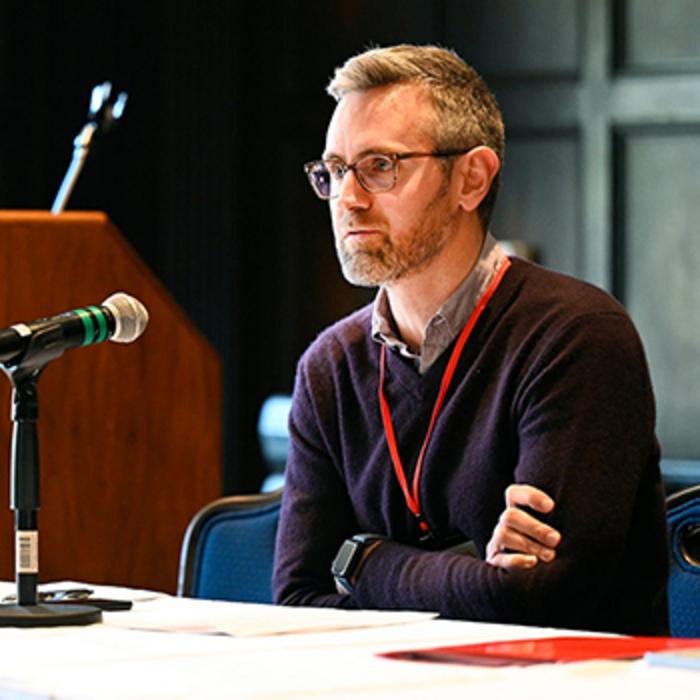State-level officials such as governors, state legislators and attorneys general are shaping U.S.-China relations as the two countries navigate a strained geopolitical relationship, according to new research by political scientist Kyle Jaros.

Credit: University of Notre Dame
State-level officials such as governors, state legislators and attorneys general are shaping U.S.-China relations as the two countries navigate a strained geopolitical relationship, according to new research by political scientist Kyle Jaros.
“The state level has independent importance in the U.S.-China relationship — it’s not just a reflection of what’s happening at the national level,” said Jaros, associate professor of global affairs in the Keough School of Global Affairs at the University of Notre Dame. “The actions taken by state and local officials — and their Chinese counterparts — not only affect their own communities, but also play a key role in shaping the overall U.S.-China relationship.”
While the U.S. Constitution clearly states that foreign policy is the responsibility of the federal government, it also leaves space for cities and states to have international relationships and even to enter into certain kinds of agreements, Jaros said.
Known as subnational diplomacy or paradiplomacy, state-level relations with China are the focus of a new study by Jaros and Sara Newland of Smith College, published in Publius: The Journal of Federalism, a publication of Oxford University Press.
Jaros and Newland, who were recently awarded a grant from the Luce Foundation to fund this work, found that states vary widely in how they engage with China and range from confrontation to cooperation or a combination of the two.
“Broadly speaking, our data analysis shows some states that are clearly pro-engagement,” said Jaros, who currently serves as a visiting senior fellow for U.S.-China subnational relations for the Truman Center in Washington, D.C. “They feel that it is still appropriate to have at least some forms of business cooperation with China and may pursue climate cooperation, tourism cooperation or educational partnerships.”
To assess states’ engagement with China, Jaros and Newland tracked changing patterns of state-level U.S.-China relations using an original dataset on cooperative and confrontational policies across all 50 U.S. states.
Of the 50 states, California serves as a leading example of a state that has continued to adopt policies that foster people-to-people contact with China, Jaros said. For example, Gov. Gavin Newsom made a high-profile trip to China in October 2023 to advance climate partnerships and economic changes, laying the groundwork for Chinese leader Xi Jinping’s visit to San Francisco the following month. Florida and Texas lie at the other end of the spectrum, Jaros said, adopting confrontational policies that curb contact between state institutions (such as government or universities) and China. Florida, for example, now restricts Chinese citizens’ and businesses’ abilities to purchase land or real estate in the state, and Gov. Ron DeSantis has publicly articulated his concern that the Communist party is infiltrating Florida’s institutions.
In Indiana, the picture is more complicated, according to Jaros and Newland’s in-depth case study of the state, which was included in the research.
“Until 2022, Indiana engaged fairly regularly with official Chinese counterparts, even as concerns and criticisms from some quarters increased,” Jaros said. “While some forms of low-key economic and educational cooperation are continuing today, many areas that once seemed appropriate or safe are now seen by Indiana officials as off-limits or dangerous.”
For years, Indiana has pursued state-level cooperation with China, as the state is home to several major corporations, including leading pharmaceutical and engineering companies, that see the Chinese market as crucial to their overall strategy. In addition, numerous small businesses see China as a crucial part of their supply chain, relying on it as a sizable export market.
And yet, last year, Indiana state legislators voted to divest the state’s pension fund from China, and the state has banned new sister city relationships with China. In 2021, state Attorney General Todd Rokita launched an investigation into Valparaiso University’s Confucius Institute, alleging that it functioned as a propaganda arm for the Chinese Communist Party.
Jaros has met with the State Department’s Subnational Diplomacy Unit about his work, and he and Newland are studying how the federal government can help U.S. states and cities coordinate knowledge-sharing and also how it can provide useful information to lower levels of government.
In his capacity as a Truman fellow, Jaros is also expanding the research to include city-level diplomacy. This summer, he and Newland, who is also a Truman fellow, will meet with city officials, chamber of commerce members and other local groups in Los Angeles; Hartford, Connecticut; Des Moines, Iowa; and Jacksonville, Florida.
“We will solicit views from the local level both for their own sake and also to bring some of it back to share with policymakers in Washington, to help them have a better awareness of how what they are doing affects local communities,” Jaros said.
A fellow of the National Committee on U.S.-China Relations’ Public Intellectuals Program, Jaros regularly briefs state and local officials on the U.S.-China relationship. In April, he delivered a presentation at the committee’s subnational symposium, held in coordination with the University of Michigan.
Jaros said the next stage of the research includes examining the consequences of what is happening at the state level, including its policy implications.
“We see policy impacts at several different levels: city, state and federal,” he said. “This work has implications for how cities and states think about what kinds of interactions with China are appropriate right now and what kinds of caution are needed.”
Contact: Tracy DeStazio, associate director of media relations, 574-631-9958 or tdestazi@nd.edu
Journal
Publius The Journal of Federalism
Method of Research
Data/statistical analysis
Subject of Research
People
Article Title
Paradiplomacy in Hard Times: Cooperation and Confrontation in Subnational U.S.–China Relations
Article Publication Date
21-Jun-2024
Discover more from Science
Subscribe to get the latest posts sent to your email.


